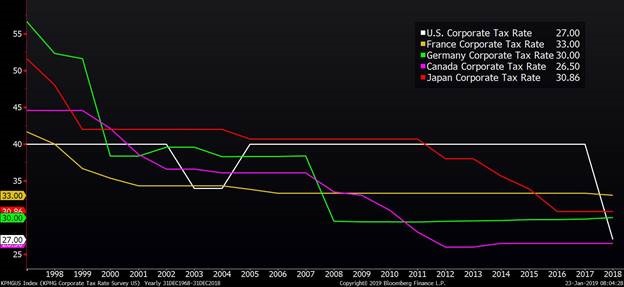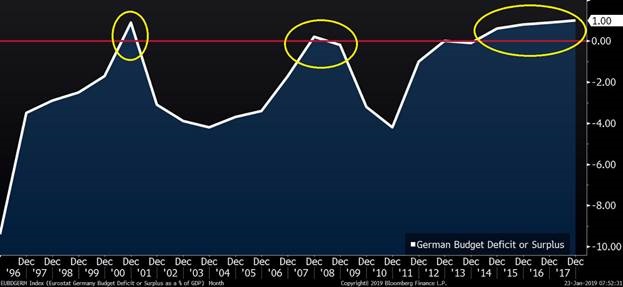The trade conflict is still underway; we just read this morning about the statement made by China’s vice president, Wang Qishan, criticizing the U.S. administration’s trade policies at Davos. We continue to believe that a deal will be reached in the near term on the disagreements that are easier to resolve, while the tougher ones — intellectual property protection, cybersecurity threats, and subsidies for China’s state-run enterprises — will take longer. We believe progress will be made on the issues of trade deficits and imports between countries, and some cuts in tariffs, by the end of March. This will lead to an extension of negotiations and will set the stage for talks on the thornier issues of theft, subsidies, and forced technology transfer, which will be continued into later 2019. We believe that in the end, and before the U.S. elections in 2020, there will be a settlement with both sides compromising toward a middle ground.
The U.S. administration’s stance against trade abuses has met with quiet approval from many of China’s other trading partners. The U.S.’ peers may not publicly approve of the style of U.S. negotiations, but it is apparent that they recognize the problems, and also want to see them addressed.
There is another area where the world is quietly getting ready to follow the U.S. administration’s lead: corporate tax policy. This trend may prove more significant for global growth in 2019 than wrangling over trade policy. The U.S. corporate tax cuts in 2018, as you can see from the chart below, finally made U.S. rates competitive with those of its peers after having been above them for much of the past two decades.

Source: Bloomberg LLP
Now there are increasing signs that in the face of a slowdown in the rate of economic growth in many countries around the world, governments will be turning to tax cuts to stimulate their economies.
Germany’s government has been discussing the need for tax cuts in the face of Europe’s slowdown. This would not be an unusual move for Germany, which has been running a budget surplus for several years. In the past, Germany has addressed slowdowns with tax cuts, and will likely do so again.
Germany: Tax Cuts in 2001 and 2009 Followed Budget Surplus Periods — And Another Cut May Be in the Works

Source: Bloomberg LLP
Other countries in the tax cut race:
• With Brexit uncertainty troubling prospects for the UK economy, British lawmakers have also made proposals to lower the corporate rate to 17% from 19% in 2020;
• Chinese officials need to stimulate growth while avoiding increased leverage from loosened credit in the country’s shadow-banking system, and have said that a tax cut is in the works amounting to about 1% of the country’s GDP;
• Canada is offering new tax breaks to businesses;
• The Netherlands are cutting the headline corporate rate from 25% to 21% and eliminating taxes on dividends;
• Australia may expand recent tax cuts for individuals and small businesses to include larger businesses as well;
• And Japan may delay a sales tax increase scheduled for later this year.
Investment implications: In the face of flagging growth, countries that still have extremely low interest rates may well follow the U.S.’ lead in competitively reducing taxes, particularly for corporations, to stimulate investment and attract business. If trade conflict anxiety begins to dissipate with headline deals on the easier items in the trade agenda, a worldwide race to reduce taxes could boost market psychology in 2019.







